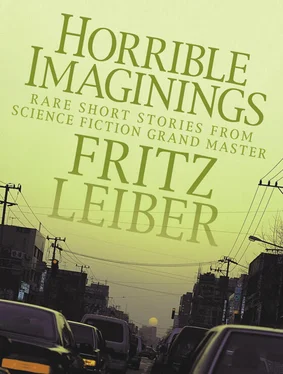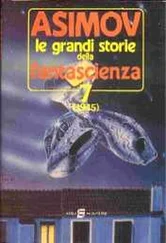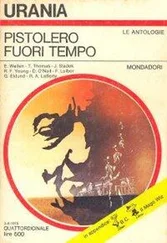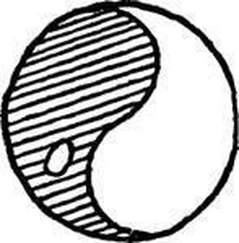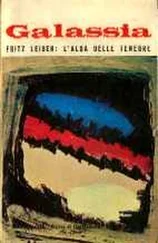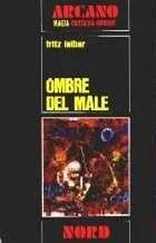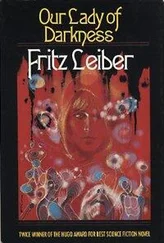The talk about ghost stories had started just after dinner at the big table in the living room with the masklike painting of Wolf’s mother Helen with the little white light below it, looking down on them from the mantelpiece on which there also stood the half dozen bottles of sherry, Scotch, and other liquors Cassius kept for his guests. The conversation had begun with the mention of haunted paintings when Wolf brought up Montague Rhodes James’ story, “The Mezzotint.”
“That’s the one, isn’t it,” Terri had said helpfully, “where an old engraving changes over a couple of days when several different people look at it at different times, and then they compare notes and realize they’ve been witnessing the re-enactment of some horror that happened long ago, just before or just after the print was engraved?”
“You know, that’s so goddam complicated,” Tilly objected, but “Yes, indeed!” Cassius took up enthusiastically. “At first the ghost is seen from the rear and you don’t know it’s one; it’s just a figure in a black hood and robe crawling across the moonlit lawn toward a big house.”
“And the next time someone sees the picture,” Wolf said, picking up the account, “the figure is gone, but one of the first-floor windows of the house is shown as being open, so that someone looking at the picture then observes, ‘He must have got in.’“
“And then the next to last time they look at the picture and it’s changed,” Terri continued, “the figure’s back and striding away from the house, only you can’t see much of its face because of the hood, except that it’s fearfully thin, and cradled in its arms it’s got this baby it’s kidnapped…” She broke off abruptly and a little uncertainly, noticing that Tommy was listening intently.
“And then what, Ma?” he asked.
“The last time the picture changes,” his father answered for her, his voice tranquil, “the figure’s gone and whatever it might have been carrying. There’s just the house in the moonlight, and the moon.”
Tommy nodded and said, “The ghost stayed inside the picture really, just like a movie. Suppose he could come out, sort of off the picture, I mean?”
Cassius frowned, lighting a cigarette. “Ambrose Bierce got hold of that same idea, Tommy, and he wrote a story, a shorter one, about a picture that changed, only as in the James story no one ever saw it at the moment it changed. The picture was mostly calm ocean with the edge of a beach in the foreground. Out in the distance was a little boat with someone in it rowing toward shore. As it got closer you could see that the rower was a Chinaman with long snaky moustaches—”
“Chinaperson,” Loni corrected and bit her lip.
“Chinaperson,” Cassius repeated with a nod and a lingering smile at her. “Anyhow as he beached the boat and came toward the front of the picture you could see he had a long knife. Next time someone looked at it, the picture was empty except for the boat in the edge of the wavelets. But the time after that the Chinaperson was back in the boat and rowing away. Only now lying in the stern of the boat was the corpse of the… person he’d killed. Now I suppose you could say he got out of the picture for a while.”
Shaking his head a little, Tommy said, ‘That’s good, but I don’t mean that way ‘zactly, Grandpa. I mean if you saw him step or float out of the picture, come off the picture like, same size and everything as in the picture.”
“That would be something,” Wolf said, catching his son’s idea. “Mickey Mouse, say, mouse life-size—no, comic book size—waltzing around on the coffee table. That tiny, his squeak might be too high to hear.”
“But Mickey Mouse isn’t a ghost, Pa,” Tommy objected.
“No,” his grandfather agreed, “though I remember an early animation where he challenged a castle run by ghosts and fought a duel with a six-legged spider. But that surely is an interesting idea of yours, Tommy,” he went on, his gaze roving around the room and coming to rest on the large reproduction of Picasso’s “Guernica” that dominated one wall, “except that for some pictures,” he said, “it wouldn’t be so good if their figures came out of the frames and walked, or floated.”
“I guess so,” Tommy agreed, wrinkling his nose at the looming bull man and the other mad faces and somber patterns in Picasso’s masterpiece.
Terri started to say something to him; then her eyes shifted to Cassius. Wolf was watching her.
Loni yielded to the natural impulse to look around at the other pictures, gauging their suitability for animation. She hesitated at the dark backgrounded one which showed the head only, all by itself like a Benda mask, of a rather young Helen Kruger with strange though striking flesh tones. She started to make a remark, but caught herself.
But Tommy had been watching her and, remembering something he’d overheard before dinner, guessed what she might have been going to say and popped out with, “I bet Grandma Helen would make a pretty green ghost if she came out of her frame.”
‘Tommy…” Terry began, while, “I didn’t—” Loni started involuntarily to protest, when Cassius, whose eyes had flashed rekindling interest rather than hurt at Tommy’s observation, cut in lightly and rapidly, yet with a strange joking or mocking intensity (hard to tell which) that soon had them all staring at him, “Yes, she would, wouldn’t she? Tiny flakes of pink and green paint come crackling off the canvas without losing their configuration as a face…. Esteban always put a lot of, some said too much, green in his flesh—he said it gave it life…. Yes, a whole flight, or flock, or fester, or flutter, or flurry, yes flurry of greenish flakes floating off and round about in formation, swooping this way and that through the air, as though affixed to an invisible balloon responding to faintest air currents, a witches-sabbath swirling and swarming…. And then, who knows? Perhaps, their ghost venture done, settling rustlingly back onto the canvas so perfectly into their original position that not the slightest crack or faintest irregularity would be evidence of—”
He broke off suddenly as an inhalation changed into a coughing fit that bent him over, but before anyone had time to voice a remark or move to assist him, he had mastered it, and his strangely intent eyes searched them and he began to speak again, but in an altogether different voice and much more slowly.
“Excuse me, my dears. I let my imagination run away with me. You might call it the intoxication of the grotesque? I encouraged Tommy to indulge in it too, and I ask your pardons.” He lit another cigarette as he went on speaking measuredly. “But let me say in extenuation of our behavior that Esteban Bernadorre was a very strange man and had some very strange ideas about color and light and pigments, strange even for a painter. Surely you must remember him, Wolf, though you weren’t much older than Tommy here when that painting of Helen was executed.”
“I remember Esteban,” Wolf said, still studying his father uneasily and revolving in his mind the words the old man had poured out with such compulsive rapidity and then so calculatedly, as if reciting a speech, “though not so much about his being a painter as that he was able to fix a toy robot I’d broke, and that he rode a motorcycle, oh yes, and that I thought he must be terribly old because he had a few grey hairs.”
Cassius chuckled. “That’s right, Esteban had that mechanical knack so strange in an artist and always had some invention or other he was working on. In his spare time he panned for gold—oh, he was up to every sort of thing that might make him money—the gold-panning was partly what the motorcycle was for, to take him up into the little canyons where the little goldiferous streams are. I remember he talked about vibrations—vibes—before anyone else did. He used to say that all vibrations were one and that all colors were alive, only that red and yellow were the full life colors—blood and sunlight—while blue was the death, no, life-in-death color, the blue of empty sky, the indigo of outer space….” He chuckled again, reflectively. “You know,” he said, “Esteban wasn’t really much of a draftsman; he couldn’t draw hardly anything worth a damn except faces; that’s why he worked out that portrait technique of making faces like hanging Benda masks; that way he never got involved in hands or ears or other body parts he was apt to botch.”
Читать дальше
